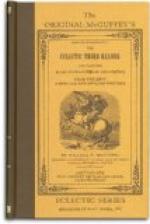[New Processes]
When the revision of 1878 was decided on, the publishers of the McGuffey Readers realized that much improvement must be made in the illustrations. About this time the magazines were placing great stress upon pictorial work and a new school of engravers came into existence. The wood engravers had already departed from the painful reproduction of each line of a pencil drawing and had become skilled in representing tints of light and shade if placed on the whitened block with a brush. This gave greater freedom of interpretation to the engraver. The next step was to have the drawing made large and reproduced on the block by photography. By this method most of the engravings were made for the edition of 1878. Care was taken to employ artists of reputation and the engravings were usually signed by the artist and by the engraver.
Before the last edition came out in 1901, photo-engraving had nearly supplanted wood engraving. By this process the artist’s drawing with the brush is reproduced in fine tints which, when well engraved and carefully printed, produce effective results. Pen and ink drawings are also reproduced in exact facsimile. By this process the hand work of the engraver is nearly eliminated. The blocks are sometimes retouched to produce effects not attained by the process work. The skill of the artist in making the drawing thus becomes all important.
[Later Inventions]
The introduction of color work in the schoolbooks intended for young children resulted from the invention of the three-color plates. From nature, or from a colored painting, three photographs are taken—one excluding all but the yellow rays of light, one for the red rays, and one for the blue. From these photographs three tint blocks are made which to the eye in many cases look exactly alike. From one of these an impression is made with yellow ink, exactly over this the red plate prints with red ink and this is followed by an impression from the blue plate. If the effects of the color screens of the camera are exactly reproduced by the printer’s inks and with exactly the right amount of ink, the result is wonderfully satisfactory.
What are the qualities in these McGuffey Eclectic Readers that won for them through three-quarters of a century such wide and constant use?
[Character Building]




